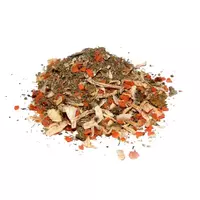Universal seasoning

Seasonings or flavors have long occupied a fundamental place in the global culinary tradition. Nowadays, like thousands of years ago, a colossal amount of seasonings, spices and spices are used to prepare various dishes. According to the definition used in the food industry, the seasonings rearrange both chemical compounds and plant components, as well as mixtures thereof.
The main purpose of seasonings is to improve the taste as well as aroma characteristics of finished culinary products. In addition, some seasonings can have a healthy and beneficial effect on the entire human body as a whole. Some types of seasoning contribute to an increase in shelf life, and therefore the sale of food.
Among the main varieties of seasonings are the following: salt, sugar and its substitutes, natural and synthetic flavors, ready-made sauces, for example ketchup or mayonnaise, as well as vegetable oils. In addition, some chemical compounds are classified as seasonings - sodium glutamate or the "fifth taste of umami, " as well as citric or acetic acids and others.
All flavors or seasonings are classified taking into account various factors. Natural and synthetic seasonings are isolated. Natural seasonings include components of plants, as well as spicy herbs that are used in the process of preparing culinary products both fresh and processed or dried.
The most well-known and widespread types of flavoring additives include spices, that is, fresh or pre-dried parts of plants that contain volatile aromatic compounds. Spice mixtures are considered a special type of seasoning. Almost all national culinary traditions of the world boast their distinctive and authentic mixtures of spices and spices.
In addition to traditional dry mixtures of spices, liquid or pasty flavors are used in cooking, among which soy sauce, table mustard, mayonnaise, suneli hops, as well as ajika, tkemali and others can be distinguished. The most widely distributed and applied around the world can be considered a universal seasoning.
Based on the name, universal seasoning is simply obliged to be suitable for the preparation of a wide range of culinary products. Currently, there are several varieties of universal seasonings that differ primarily in their composition. As a rule, the most popular spices and spices are included in the universal seasoning.
Composition of the universal seasoning
Often, in addition to flavors, dried pieces of vegetables, as well as spicy herbs, such as carrots, onions, dry parsley, dill or celery root, are added to the universal seasoning. The versatile seasoning is a mixture of spices, as well as small pieces of dried vegetables, roots and herbs. Universal seasoning can be used in the process of preparing any dishes from meat, poultry, as well as fish. The versatile seasoning is great for both first and main courses.
The generic seasoning may include various components. However, as a rule, the composition is unified and is a mixture of dried onions, carrots, paprika, celery, as well as parsnips, bay leaves, black peppers, coriander, dried dill and parsley. Among other things, the composition of the universal seasoning includes salt and sugar, as well as a dietary supplement of sodium glutamate or Ye621, which nowadays costs a very small number of food producers.
89 kCal universal seasoning
Energy value of the universal seasoning (Ratio of proteins, fats, carbohydrates - ju):
Proteins: 7.8 g (~ 31 kCal)
Fats: 0.7 g (~ 6 kCal)
Carbohydrates: 12.8 g (~ 51 kCal)
Energy ratio (bj | y): 35% | 7% | 58%
 Español
Español Français
Français Português
Português Русский
Русский 简体中文
简体中文 繁體中文
繁體中文 日本語
日本語 한국어
한국어 العربية
العربية Türkçe
Türkçe Қазақ
Қазақ Deutsch
Deutsch Italiano
Italiano Українська
Українська
